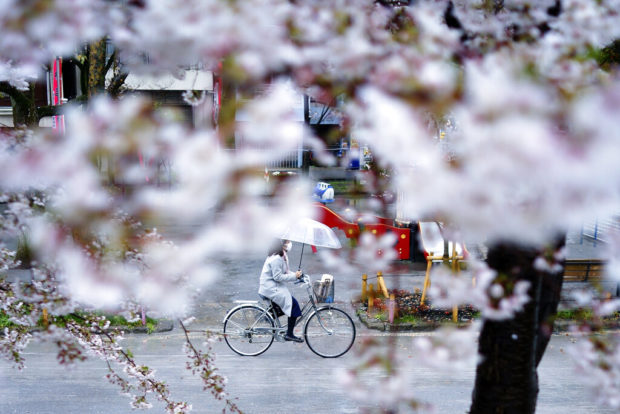What you need to know today about the virus outbreak
As hot spots flared around the United States in places like New Orleans, Detroit and Southern California, New York was the hardest hit of them all, with bodies loaded onto refrigerated morgue trucks by gurney and forklift outside overwhelmed hospitals.
And the worst is yet to come, with Vice President Mike Pence comparing the U.S. trajectory to that of Italy.

A woman wearing a protective face mask to help stop the spread of the coronavirus rides a bicycle past blooming cherry blossom trees Wednesday, April 1, 2020, in Tokyo. The new coronavirus causes mild or moderate symptoms for most people, but for some, especially older adults and people with existing health problems, it can cause more severe illness or death. (AP Photo/Eugene Hoshiko)
Experts warned that there could be 100,000 to 240,000 deaths in the U.S. even if social distancing guidelines are maintained. America now has more than 4,000 dead from the outbreak.
Here are some of AP’s top stories Wednesday on the world’s coronavirus pandemic. Follow APNews.com/VirusOutbreak for updates through the day and APNews.com/UnderstandingtheOutbreak for stories explaining some of its complexities.
WHAT’S HAPPENING TODAY:
— Scientists offered more evidence Wednesday that the coronavirus is spread by seemingly healthy people who show no clear symptoms, leading the U.S. government to issue new guidance warning that anyone exposed to the disease can be considered a carrier.
— The majority of Americans approve of how state and local governments are handling the coronavirus outbreak, but fewer than half say the same about the efforts of President Donald Trump and the federal government, according to a new poll from The Associated Press-NORC Center for Public Affairs Research.
— U.S. stocks and markets around the world fell sharply Wednesday as the economic and physical toll caused by the coronavirus outbreak mounts — and as experts say they still can’t predict when it will end. The global economy could shrink by almost one percent this year instead of growing at a projected 2.5%, according to a new report Wednesday from the United Nations.
— Vice President Mike Pence said the White House’s models for the coronavirus outbreak show the country on a trajectory akin to hard-hit Italy. Pence was referencing the prediction models unveiled Tuesday by the White House that project 100,000 to 240,000 U.S. deaths in the pandemic. Those figures assume that the country maintains rigorous social-distancing practices for the duration of the public health crisis.
— Background checks required in the U.S. to buy firearms spiked to record numbers in the past month, fueled by a run on guns from Americans panicked about their safety during the coronavirus crisis. The 3.7 million background checks done in March were the most for a single month since the system began in 1998, FBI figures show.
— The Grand Canyon closed to visitors Wednesday as Interior Secretary David Bernhardt finally approved the national park’s request at the recommendation of a local health official who said keeping the park open puts employees, residents and tourists at risk. It joins a growing list of national parks shutting their gates to prevent the spread of the coronavirus despite Bernhardt’s decision two weeks ago to waive entrance fees to make it easier for Americans to enjoy the parks.
— The IRS and the Treasury Department say Americans will start receiving their economic impact checks in the next three weeks. AP’s business team sets out what you need to do to get your check.
WHAT YOU NEED TO KNOW:
For most people, the coronavirus causes mild or moderate symptoms, such as fever and cough that clear up in two to three weeks. For some, especially older adults and people with existing health problems, it can cause more severe illness, including pneumonia and death. The vast majority of people recover.
Here are the symptoms of the virus compared with the common flu.
One of the best ways to prevent spread of the virus is washing your hands with soap and water. The U.S. Centers for Disease Control and Prevention recommends first washing with warm or cold water and then lathering soap for 20 seconds to get it on the backs of hands, between fingers and under fingernails before rinsing off.
ONE NUMBER:
— 27,000: U.S. companies shed 27,000 jobs in March, according to a private survey, a figure that mostly reflected the economy as it stood before the full impact of the viral outbreak.
GSG
For more news about the novel coronavirus click here.
What you need to know about Coronavirus.
For more information on COVID-19, call the DOH Hotline: (02) 86517800 local 1149/1150.
The Inquirer Foundation supports our healthcare frontliners and is still accepting cash donations to be deposited at Banco de Oro (BDO) current account #007960018860 or donate through PayMaya using this link.